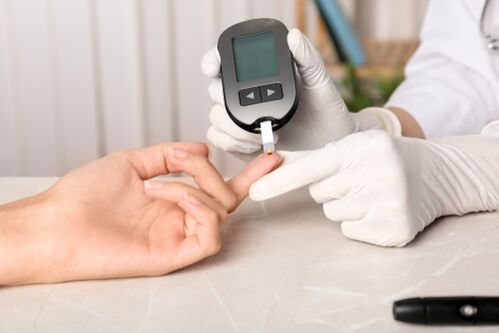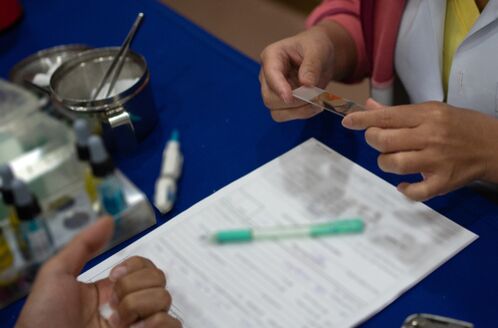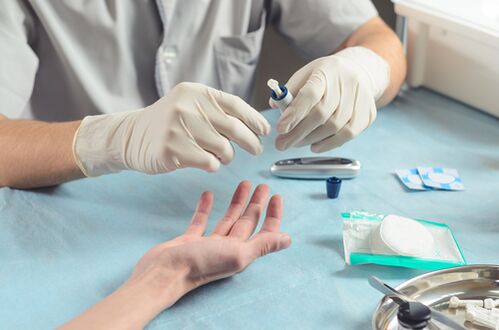
Diabetes mellitus is a chronic endocrine disease characterized by the inability to absorb glucose that comes from food and is necessary for nutrition, breathing and cell energy metabolism. In this case, production or interaction with pancreatic hormones - insulin is affected. It is required to control the presence of quantitative glucose in the bloodstream. With improper operation of a pair of glucose -sensulin, hyperglycemia is a continuous increase in glucose. Metabolism suffers, kidney, heart, blood vessels and central nervous systems are disrupted.
Type of diabetes
Two main types of diabetes are distinguished, which, although they belong to one group of endocrine diseases, still have a difference.
The first type of diabetes (insulin -depending, juvenile, inzsd I type)
It is characterized by the fact that for any reason the immune system invades pancreatic beta cells (more than 80%), producing insulin. No hormones, but glucose is transmitted to the body with food continuously. Blood sugar disappears. The first type of diabetes is most commonly detected in children or adolescents. But for adults, it's not uncommon.
The second type of diabetes (insulin -depending, ii ii)
Type II diabetes is more often diagnosed in people after 30-40 years. But the disease is getting younger. In 90 % of cases in patients, overweight is observed. The body can still produce insulin, but the sensitivity of the cell to the insulin is reduced (this is called insulin resistance). Devil circles arise. Cells do not feel insulin, the body produces more insulin to feed; cage. Glucose only accumulates in the blood, and insulin increases appetite. Someone eats, jumps sugar, insulin resistance is increasing.
Prediabetes
Here, glucose levels exceed the reference value, but you can't talk about diabetes. Prediabetes can be the basis for the development of type II diabetes, as well as cardiovascular system diseases.
Gestational diabetes is a feature during pregnancy. Most often found in trimester II or III.
Also, the disease differs from severity: light (I), moderate (II) and weight (III).
Diabetes. Symptom
If you do not have the habit of donating blood for glucose once a year, and you do not know the endocrinology of the clinic personally, there are some symptoms that can tell you that it's time to contact a specialist. But we will make a reservation immediately, the signs of diabetes are shown if insulin deficiency is moving to a critical point. Therefore, at this time, the most effective way to know your sugar level is to donate blood.

First type diabetes
Symptoms of first type diabetes:
- Continuous wear, irreversible;
- dry mouth;
- frequent urination;
- indifference and fatigue;
- dissatisfied hunger;
- weight loss (average 3-5 kg), not related to any action from a person;
- Problems with vision (the confusion of the picture, as if everything was in the fog).
The second type of diabetes
Symptoms of the second type of diabetes are similar to type I diabetes in some parameters: it is thirsty, starvation, dry mouth, fatigue, vision problems and frequent impulses to the toilet. But this type has its own signs:
- numbness and tingling in the arms and legs;
- Slow wound healing and repeated infections.
The cause of diabetes

Unfortunately, scientists cannot name the real causes of the development of diabetes in humans (especially the first type). Poor ecology, many virus infections and insufficient immune system surgery are taken as a basis. Some of the causes of the development of diabetes mellitus are usually distinguished:
- Descent tendency. In addition, the risk of reaching 10%if the father is ill with the first type of diabetes, and 2. 5%if the mother. If both parents are diagnosed with type II diabetes, then the child has the risk of the disease after 40 years increasing to 65-70%;
- Diet is not balanced with many carbohydrates;
- Overweight (90% of people with type II inzsd have it);
- lack of physical activity;
- constant pressure;
- prediabetes;
- the use of certain drugs (diuretics, hormones, salicylates, cytostatic, etc. );
- ethnicity (in European children, the risk of developing a higher type of diabetes);
- History of Gestational Diabetes;
- Chronic deficiency of adrenal cortex.
Complication
The disease is dangerous, and if you do not see the doctor's instructions, then the complications of diabetes (chronic and acute) may appear, affecting the work of the whole organism. Chronic complications are observed when high sugar levels last.

The following chronic complications can be distinguished:
- The weakness of the blood vessels in the retina (retinopathy) leads to a decrease in visual acuity, early development of cataracts or cause blindness.
- With diabetes, periodontitis often occurs, leading to tooth loss or liver problems. Also, various infectious diseases of the oral cavity are possible. It is necessary to observe hygiene well and visit the dentist regularly.
- Cardiovascular disease is a leading cause of defect and death in diabetics. Angina pectoris, myocardial infarction, stroke and more. Lack of observation of cholesterol and glucose levels, increased blood pressure contributes to the development of these complications.
- Nephropathy, or destruction of blood vessels in the kidneys, leads to functional failure or kidney rejection. Hell control is required.
- Neuropathy (nerve damage). Often, the risk of neuropathy is exposed to the feet. The vessel walls and nerve fibers are destroyed, blood flow to the foot. The signs of neuropathy development are tingling, pain, crawling goosebumps or loss of sensitivity. Patients, especially the elderly, usually do not attach this meaning, which is full of ulcers, infectious diseases and amputation. Neuropathy can affect other body systems (erectile dysfunction, problems with gastrointestinal tract, genitourinary system).
- Diabetes is one of the causes of atherosclerosis, as vessels become fragile, fragile and increase the risk of thrombus.
- Usually joint pain, as diabetes leads to a decrease in the amount of synovial fluid.
- Also, there is a high frequency of development of mental disorders.
Acute, rapid complications, usually related to fluctuations in blood glucose. Low (hypoglycemia) and high (hyperglycemia) lead to crisis. Hypoglycemia crisis (3. 9 mmol/l or lower) presents themselves as seizure, and hyperglycemic crisis is harmful to the incidence of diabetes ketoasidosis and hyperglycemic conditions. This is an emergency and threatening condition, leading to seizures, coma and fatal outcomes.
Diagnosis of diabetes
Diagnosis of diabetes is an important step. In ideal situations, one should be aware of glucose levels, especially after 45 years. But if it is at risk, then the analysis should be done more often and you need to do it early, so as not to miss a valuable time.

Diabetes is diagnosed in several ways:
- Analysis for glycerin hemoglobin. The analysis results show the average level of glucose in the blood for the past 2-3 months. So you can detect dynamics;
- Glucose analysis in blood plasma (capillaries or veins) on an empty stomach. The audit shows the current position of glucose;
- Gluczotolerant tests are prescribed in cases of doubt. The test lasts long and includes measurement of glucose levels before and after taking a glass of water with glucose dissolved in it;
- Urine analysis for the presence of glucose and/or acetone. Healthy people are not characterized by the presence of these elements in the urine.
Treatment

When treating type I diabetes mellitus, the main treatment for insulin is the main treatment for insulin, which must be administered daily in prescribed doses and is calculated by the attending physician. You can use special insulin injections, syringes or insulin pumps, independently calculate the required dose of hormones filed. Under certain circumstances, it is possible to prescribe medicines for diabetes that stimulate the body to develop their own insulin.
In the first species diabetes, insulin chips daily, as PAS is full of diabetes ketoasidosis, which causes death. Daily insulin + proper nutrition + physical activity can provide life without complications.
With type II diabetes, doctors prescribe drug treatment designed to reduce sugar levels and normalize one's condition. Sometimes it may be necessary for replacement therapy with insulin, but it does not need to be accepted daily. Diet in diabetes is observed without fail, as well as increased physical activity, weight control.
With the presence of pre-diabetes, the examination must be done once every six months or a year. It is also necessary to lose excess weight and switch to nutrition.
With gestational diabetes, it is necessary to carefully monitor glucose levels in the blood and follow the advice of a good doctor. Usually after giving birth, blood sugar returns to normal. But there is a risk of developing a second type of diabetes.
Forecast and prevention
Diabetes mellitus is a serious endocrine disease that reduces life by 5-10 years, and men die more often than women. Infectious diseases and viruses are worse. Complications to the background of pores, influenza occurs 6 times more frequently, than statistics by people without diabetes in history. In healthy people, compared to diabetics, alzheimer's and other forms of dementia are increasingly developing.

But with diabetes you can and should be fought. Competent management helps them to avoid many problems and complications. Therefore, 50-60% of cases of disease are stable and do not develop.
Proper control and prevention of diabetes is:
- regular glucose examination;
- a special diet for diabetes;
- play sports in moderate mode;
- observation of blood pressure and cholesterol;
- permanent visits to the necessary experts and undergoing surveys;
- Take the medication prescribed by the doctor.
Diabetes is not fully studied, but medicines and consciousness of their lives with the disease will help live for a long time and without complications.
























